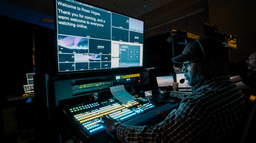🌐 Expanding Role of IT and AV: Embracing the Role of System Integrators 🌐

Related Content

 Wikimedia Foundation, Inc.
Wikimedia Foundation, Inc.
Systems integrator - Wikipedia
From Wikipedia, the free encyclopedia
Technology continues to evolve at a rapid pace, and with it, our reliance on information technology (IT) and audiovisual (AV) systems has become increasingly vital. These traditionally independent domains are now converging, presenting exciting opportunities for professionals working in these fields. As organizations seek to streamline their operations and enhance efficiency, the role of IT and AV professionals is transforming into that of a systems integrator. Let's explore this evolving landscape where IT and AV professionals are taking on more significant responsibilities as system integrators.
✨ Bridging the Gap: Integrating IT with AV ✨
Traditionally, IT and AV departments operated in separate silos with distinct objectives, technologies, and support structures. However, with the growing importance of collaborative environments and the need for seamless connectivity, the lines between these divisions have blurred. As IT systems become more integrated with AV components, professionals who understand both disciplines are better positioned to deliver cohesive and efficient solutions.
🚀 The System Integrator Advantage 🚀
As technologies increasingly interlock, the role of the system integrator becomes invaluable. By combining expertise in IT and AV, these professionals can seamlessly merge systems, maximizing their potential and improving overall performance. With comprehensive knowledge of network infrastructure, audiovisual engineering, and software integration, system integrators help organizations achieve synergy across their technology stack.
💡 Key Responsibilities of a System Integrator 💡
1️⃣ Consultation: System integrators work closely with organizations to understand their unique objectives, challenges, and technology requirements. They leverage their deep knowledge of IT and AV systems to advise on implementation strategies with attention to cost efficiencies, scalability, and compatibility.
2️⃣ Design: By leveraging their expertise, system integrators collaborate with IT and AV teams to design and optimize systems that are tailored to meet specific organizational needs. They ensure seamless integration, reliable performance, and user-friendly interfaces to enhance operational efficiency.
3️⃣ Installation and Configuration: System integrators are responsible for the proper installation of hardware and software components across the integrated IT and AV infrastructure. They ensure all systems function optimally, testing and addressing any compatibility issues while working alongside different stakeholders involved in the project.
4️⃣ Troubleshooting and Maintenance: With their combined knowledge of IT and AV systems, system integrators excel at troubleshooting and resolving complex issues. They proactively monitor systems, making necessary adjustments and upgrades to ensure the smooth operation of the integrated environment.
🌟 A Transformative Era 🌟
As we embrace the digital age, the need for system integration, encompassing both IT and AV, has grown exponentially. Success in today's fast-paced world requires collaboration, connectivity, and streamlined operations. By assuming the role of system integrators, IT and AV professionals are leading the way to meet these dynamic requirements.
🔜 The Future Beckons 🔜
Looking ahead, the integration of IT and AV systems will become even more intricate. Innovations, such as Internet of Things (IoT), artificial intelligence (AI), and augmented reality (AR), will further expand the role of system integrators. Professionals with the ability to navigate this evolving landscape will play a pivotal role in shaping the successful adoption of cutting-edge technologies, helping organizations thrive in an increasingly interconnected world.
#IT #AV #SystemsIntegration #TechnologyIntegration #ITProfessionals #AVProfessionals #FutureofTech #Collaboration #Efficiency
Latest Content
Celebrate International Women's Day With the AVIXA Women's Council!






Please sign in or register for FREE
If you are a registered user on AVIXA Xchange, please sign in
Thank you for posting this piece on the evolving landscape of IT and AV professionals and the role that system integrators play in it! The ability to pivot and adapt has always been so vital. So, professionals with the ability to navigate this evolving landscape will certainly be better positioned. And in terms of the future, it's interesting to think about how innovations like AI will further expand the role of system integrators too.
@Rusty Stewart, thanks for sharing your insights. The AV/IT convergence is a critical aspect in healthcare - from interoperability issues to operating room management and across every aspect of patient care. I'd love to have you share any use cases from Marshall Industries and discuss any instances of collaborating with an IT team that resulted in improved care and efficiencies.
Use Case: Implementation of a Healthcare Solutions Technology System
Primary Actor: Marshall Industries, a Solutions Technology Company
Secondary Actor: Hospital IT Group
Goal: Successfully implement a healthcare solutions technology system in collaboration with the hospital IT group to improve nurse workflow and patient care.
Preconditions:
- Marshall Industries has established a relationship with the Rauland Borg division of Ametek for integrating low-voltage technologies in healthcare settings.
- The hospital IT group has been identified as the primary point of contact and communication for the implementation of the project.
Main Flow:
1. Marshall Industries communicates with the hospital IT group to establish good communication and a strong working relationship.
2. Both parties discuss and determine the IP ranges and subnet ranges required for the system implementation.
3. If necessary, a VLAN is created specifically for the project to ensure equipment integration on the network.
4. Network security and firewall protocols are reviewed and implemented to maintain data security.
5. Marshall Industries assists in expanding the hospital's network infrastructure if required for higher bandwidth levels by pulling data wire and installing access points or routers.
6. The IT group and Marshall Industries work together to integrate nurse-call systems with mobile phones, such as Spectralink, enabling nurses to receive safety alerts and patient information from anywhere in the hospital and to talk to patients anywhere in the hospital.
7. Integration of alarms from Stryker hospital equipment, such as beds and IV machines, into the Rauland nurse call system is implemented. This allows for faster response times by relaying alarm information to nurses' desks and mobile phones.
8. In patient rooms, TV controls and lighting controls are integrated into the patient's remote for improved independence and control during their recovery.
9. Same-day surgery rooms are equipped with two-way communication systems, enabling doctors to communicate with their teams without raising their voices or seeking attention from supporting staff.
10. Music systems are installed in surgery centers to boost Staff morale during long surgeries.
11. Campus-wide paging systems are installed and integrated with other safety systems, like the Rauland Enterprise system. These systems can automatically relay pre-recorded emergency messages to specific sections or the entire campus, based on the emergency call initiated.
Postconditions:
- The healthcare solutions technology system has been successfully implemented in collaboration with the hospital IT group to improve nurse workflow and patient care.
- Workflow improvements and faster patient care are achieved through the integrated systems.
- Marshall Industries continues to provide support and maintenance for the implemented system.
That, @Rusty Stewart, is a very "healthy" use case! Thanks for sharing AV/IT technologies' wealth of impact on healthcare - from networks and collaboration to workflows and direct patient care. Truly inspiring. I look forward to your future contributions!
Maybe Xchange should host a Healthcare technologies room. Thoughts?